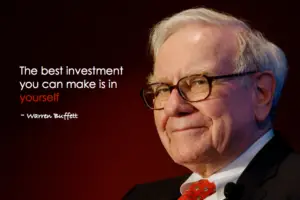When we are considering an investment, the last thing that comes into our minds is knowledge. Instead, we try to look for stocks that will appreciate in price, or even bonds or another asset class. However, there is a strong case to be made that investing in knowledge is the best way to get the most returns.
In this article, we will analyze the importance of knowledge, and you can differentiate yourself from the crowd by doing it.
What does an Investment in Knowledge mean?
Investing in knowledge means investing in yourself. We tend to think of investments, as assets we own that will generate income, and appreciate in value. However, we can also consider ourselves assets.
By investing in your education, you can also increase your income, and the price someone is willing to pay for your work, and your knowledge. A skill could be learned from a course that could be used to offer a skilled service at a premium.
Who said investing in yourself pays the best interest?
“An investment in knowledge always pays the best interest.” — Benjamin Franklin
This was taken from his book ‘The Way To Wealth’ written in 1758. Although this is just shy of 300 years ago, this quote still rings true in the present day and will likely continue to do so in the foreseeable future.
Why is knowledge the best investment?
Investing in knowledge or in ourselves allows us to expand and develop our skillset. This will be extremely useful throughout our lives, as it will allow us to make better decisions.
One of the advantages of investing in knowledge over conventional assets is that it always stays with us. You may lose money on your investment, but nobody can take knowledge away from you.
It gives you wisdom, experience, and it gives you the ability to make the best-informed decisions. This is why investing in ourselves is crucial. Warren Buffett also shares the same opinion, and he has been very outspoken about it.

Here is a video of Warren Buffett expanding on the importance of investing in yourself:
How is knowledge an investment?
By definition, an Investment is ‘the action or process of investing money for profit or material result. Although investing in knowledge will not instantly generate any profits, it has the end goal of improving yourself. This leads to being able to charge more money for your services or ask for a better salary. Allowing you to have a higher return on time invested.
Investing in knowledge does not require buying expensive courses. In fact, today there are several high-quality courses that are free of charge, or very affordable.
The profit or material result expected can be seen in a few different areas:
- Improved decision making
- Improved understanding of certain topics/situations
- Obtaining a new skill that can be monetized
How do you make an investment in knowledge?
Based on the above, how is an investment in knowledge made? It doesn’t follow the same principles as the stereotypical financial investment as it requires some dedication and persistence.
There are a few options that can be explored:
- Taking a course - there are a few big course platforms out there like Udemy and SkillShare that offer great courses that can improve knowledge on any desired subject.
- Read books - all of the greatest investors such as Warren Buffet, Benjamin Franklin and Benjamin Graham have all written books, sharing their knowledge and wisdom. This is a great way to learn about how they succeeded and avoid mistakes they made along the way.
- Find a mentor - this includes being surrounded by those who have a greater understanding of a given topic. These people will naturally lift those around them to their level. The best way to do this is by looking on sites such as Meetup where groups of these people can be found.
What is the importance of knowledge?
Knowledge allows you to improve yourself, and make better decisions. It allows us to develop our critical thinking, which can have a tremendous impact on our lives.
Improved decision making, allows us to choose not only the best investments but also the best life paths. The key is to always keep learning, and develop ourselves.
Why knowledge important for success
Although the definition of success varies depending on our individual goals, there is no denying that knowledge is a crucial part of success. As it creates a ripple effect over our entire lives, drastically improving our ability to achieve success.
Increasing your knowledge of different areas of interest will lead to having more meaningful conversations, making stronger friendships, and living a more fulfilled life overall.
Why is knowledge important in business?
Finally, an investment in knowledge is extremely important for business. This is true for any line of business. Due to the fast-paced nature of any business, it is crucial to make tough decisions in a short-time. Having the knowledge to make the right decisions at the right time, can be the difference between failure and success.
As a business owner, an investment in knowledge will potentially lead to understanding customer needs in greater depth and understanding complexities such as costing, tax, and employer responsibilities.
As an employee, it could mean being able to perform your job to a higher standard and potentially quicker. This will increase the likelihood of a raise or promotion.
As an investor, an investment in knowledge will lead to better decision-making and improved foresight.
Why some people do not invest in knowledge?
The main reason is that they do not foresee the value proposition of improving themselves. Some individuals strive for knowledge, and to develop their skills as much as possible.
This not only makes them desirable employees, but it also gives them the experience and know-how to make the best decisions with their lives, their businesses, and careers.
It is also difficult to make the connection between investing in ourselves and generating more income. We tend to think of assets as the only way to generate income, and often forget that we end up being our best asset.
Conclusion
It is clear now that an investment in knowledge is the best investment you can make. Although there is nothing tangible you will earn directly from improving your knowledge, in the long term, the benefits will be clear to see.
It may be tempting to jump straight into an endeavor straight away - however, by considering whether an investment in knowledge can be made, there is a potential opportunity to increase the likelihood of success over the longer term.

